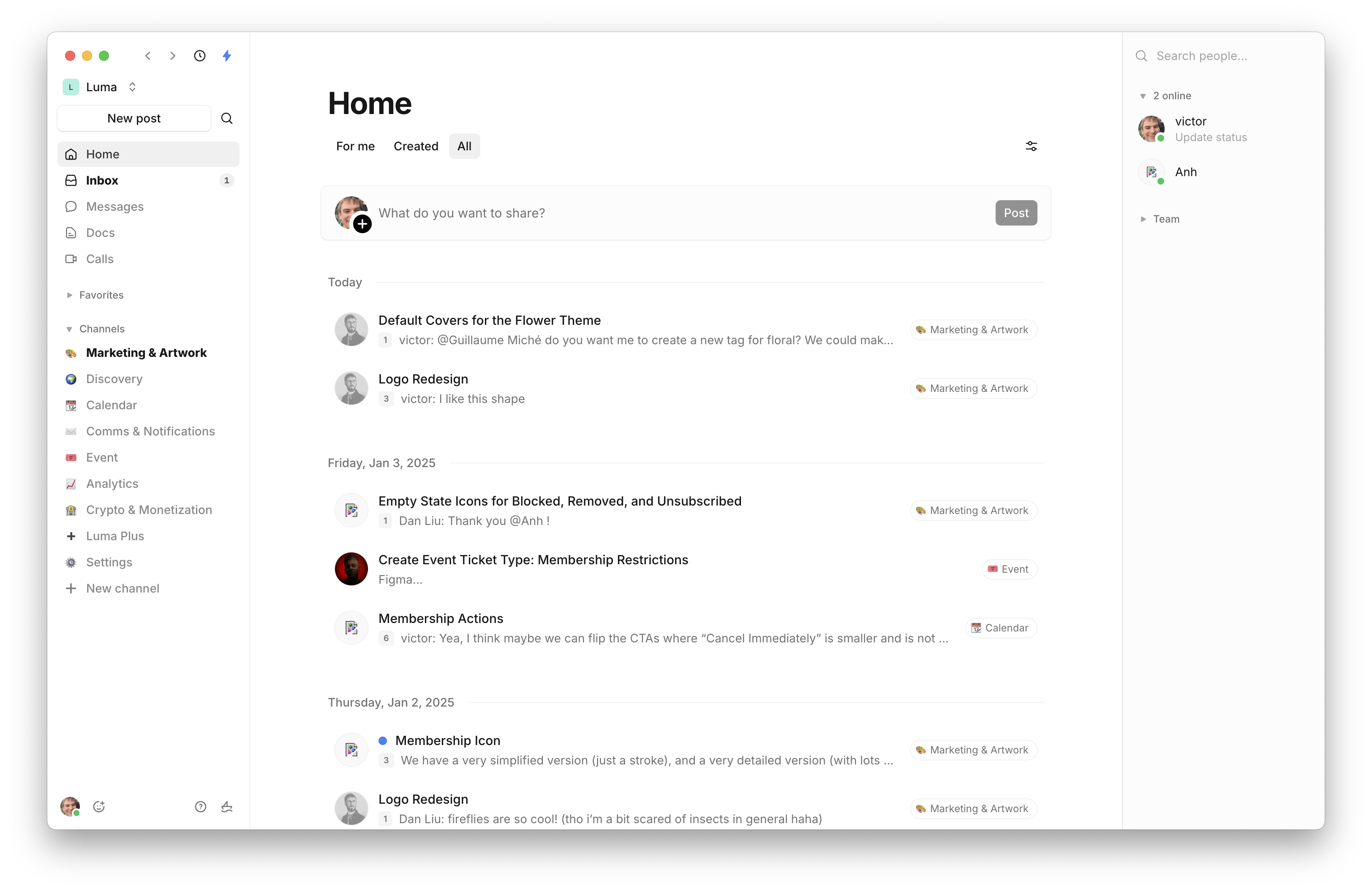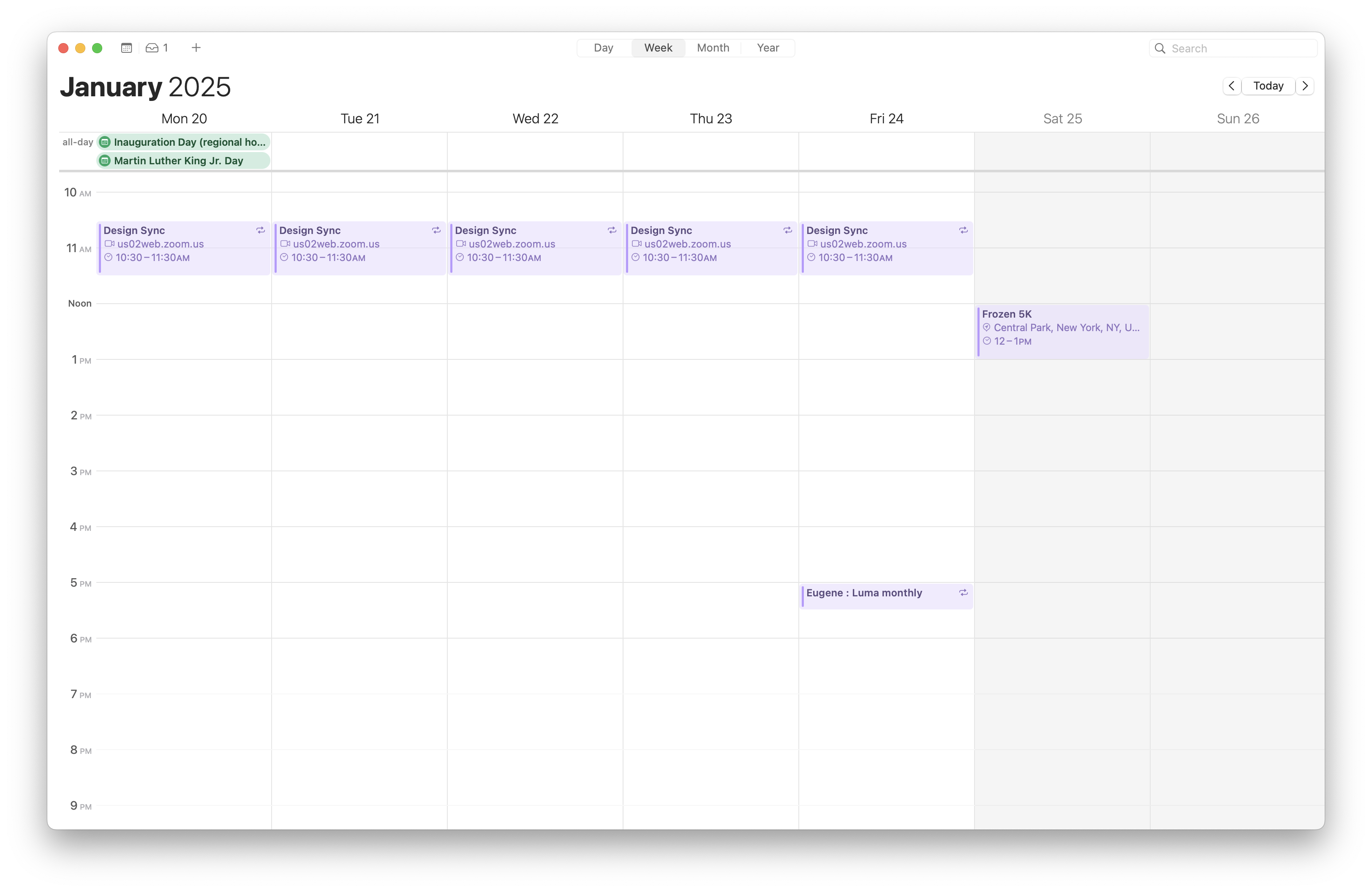I think Luma is relatively atypical in how we work. It certainly doesn’t feel weird to me, but when I hear about other companies, it’s clear that we do a few things differently.
The Team
Today we have 6 full-time people working on Luma — 3 engineers and 3 designers. That includes the co-founders, me and Danqing.
Given that we have such a small team and a relatively large surface area (API, web, iOS, Android, event pages, emails, SMS, graphics, etc, etc), each person works on a large variety of things. Each designer creates product and graphic designs and each engineer codes on multiple platforms.
We’ve been lucky enough to be able to grow without spending time on marketing or sales. Luma has grown pretty much entirely organically via word of mouth. So everyone on the team is focused on building and improving the product.
In addition to the full-time team, we also have support from a few contractors who work on design, engineering, and customer support.
Remote vs In-Person
Danqing and I started Luma during COVID in early 2020 so when we built the team, it was remote-first out of necessity. That remote-first culture continues today.
Danqing and I are in NYC and while we meet up a few times a week, the rest of the team is spread out across countries and timezones. We mostly work async and don’t spend much time chatting — so we’ve had success building a global team.
Luma is a work-first company. We don’t have a Slack channel where we are sharing memes or what we did over the weekend (we don’t even use Slack). Everyone on the team cares about their craft and when we talk, we talk about work.
That being said, I hope we can build a larger contingent in NYC and get an office in the next year.
Communication and Tools
 We do most of our communication in the context of work product. For engineers, that means talking in GitHub and Linear. For designers, that’s Figma, Campsite, and Linear. We find that it’s much easier to discuss something that’s in progress.
We do most of our communication in the context of work product. For engineers, that means talking in GitHub and Linear. For designers, that’s Figma, Campsite, and Linear. We find that it’s much easier to discuss something that’s in progress.
We also use Luma chat to fill in the gaps. We built Luma chat a few years ago for event guests and we’ve been using it internally ever since. It’s not as fully featured as Slack — but that means it’s also much less distracting and confusing than Slack.
Meetings
 We have two recurring meetings:
We have two recurring meetings:
- Design Sync - We do this meeting every day in the morning East Coast time. Designers share their latest designs and we all give feedback. Designers are encouraged to post their work to Campsite or Linear ahead of the meeting. This can be anywhere from 15 minutes to 1.5 hours.
- All Hands - We have a weekly All Hands on Monday at noon. Everyone should join this, but some people can’t join due to timezones or other commitments. We review numbers, what we shipped last week, and the plan for the upcoming week. And we take a photo! This meeting is usually under 15 minutes.
That’s it. We don’t do much in addition to this. If you need to talk to someone, you can send them a Zoom link over chat, but this is pretty rare.
We also do very few customer calls. Our customers are always writing to us via email and Luma chat. Danqing and I do some calls with customers — but it’s not a daily thing.
Personally I find calls tiring and most calls are pretty inefficient. So I like having few meetings.
Work/Life Balance
 I think work/life balance isn’t a coherent concept. I never think about my work/life balance — instead I think about if I’m motivated by my work, if I’m spending enough time with friends, and if I’m happy and healthy.
I think work/life balance isn’t a coherent concept. I never think about my work/life balance — instead I think about if I’m motivated by my work, if I’m spending enough time with friends, and if I’m happy and healthy.
That being said — people often ask about work/life balance. So I’ll try to give some context.
I work pretty much every day (>99%). Danqing also does. But most of the team takes most weekends off and schedules vacations.
We want to build a team that cares about their craft, is invested in the future of the company, and cares about building something great in the long-term.
Luma doesn’t satisfy the social need for anyone on the team, that’s what friends and family are for. Luma gives people an outlet to do their best work and to be pushed to learn and improve every day.
The Future We’ve kept the Luma team small as we’ve scaled from nothing to a few million users. We want to keep growing the team, but we will continue to do so in a slow, deliberate manner.
Personally, I’ve seen too many founders shift from doing productive work to putting out fires and managing politics. It doesn’t seem fun and it looks horribly inefficient.
In order to keep the team small, we’ve had to make a conscious decision to not do certain things. We spend most of our time building the product and thus don’t have bandwidth for live demos, sales calls, or partnerships. I’m sure these would help us grow, but everything comes with a tradeoff.
When I wake up in the morning to start working, it still feels the same as it did when we started 4 years ago. I sit in front of my computer and try to build something great.